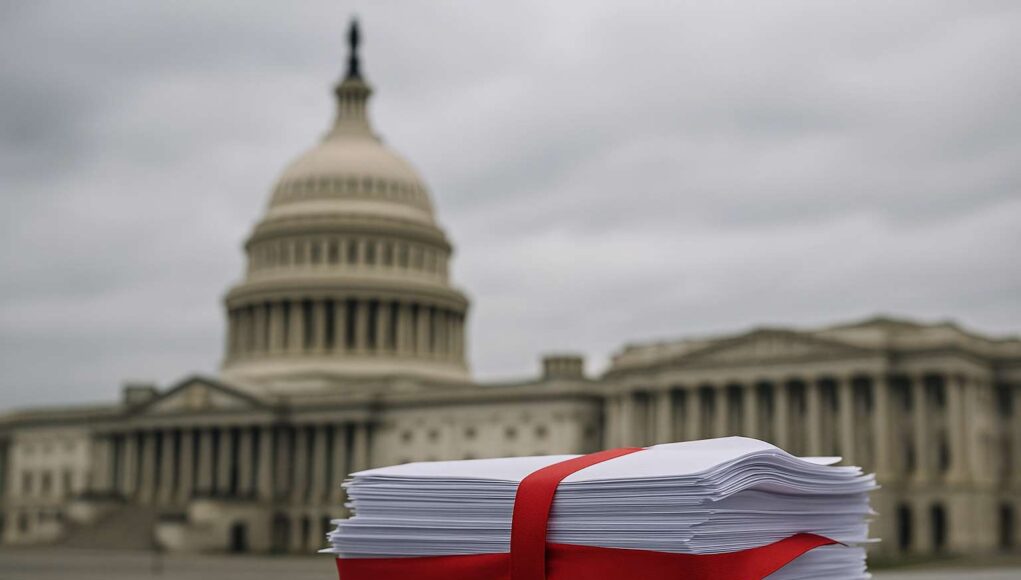Congress’s highly anticipated Crypto Week was designed to advance US crypto regulation through three key House crypto bills: the GENIUS Act, the CLARITY Act, and the Anti-CBDC Act. Together, these proposals aim to establish clear stablecoin regulation, clarify federal oversight of digital assets, and prevent the issuance of a central bank digital currency (CBDC) by the Federal Reserve.
However, as of midweek, progress remains uncertain. Republican infighting and what some now describe as a Republican crypto revolt among House hardliners have derailed planned votes, despite efforts by Donald Trump and GOP leadership to rescue the package. While financial markets have briefly cheered signs of momentum, crypto regulation news remains mired in political gridlock. The fate of these bills, and the future of US crypto regulation, hangs on whether the GOP can resolve its internal disputes in the coming days.
Inside the GOP Revolt: How Politics Threw Crypto Legislation Off Course
What began as a routine procedural vote to bundle the bills into a single package (H.Res. 580) quickly exposed deeper fractures within the Republican Party. The House Freedom Caucus and other hardline conservatives rejected the maneuver, using their opposition as leverage in unrelated battles over leadership and legislative strategy. Their actions reflect the latest episode in the broader Congress crypto debate that has plagued bipartisan efforts to regulate digital assets.
Key Reasons Behind the Revolt:
- Procedural Protest: Hardliners opposed the leadership’s attempt to force multiple votes into a single package without broader negotiation.
- Wider Grievances: The rebellion reflected frustration with Speaker Mike Johnson’s handling of spending bills, Ukraine aid, and internal power dynamics.
- Symbolic Defiance: Some members defied Trump’s crypto policy guidance to pass the bills as a statement of independence.
Although Trump intervened to flip some holdouts, the rebellion has so far stalled the legislation. The leadership’s path forward remains unclear as procedural negotiations continue.
The Legislation: What’s at Stake for the Crypto Industry
The GENIUS Act
- Purpose: Create a comprehensive federal framework for stablecoins, requiring one-to-one reserve backing, regular disclosures, and licensing.
- Senate Status: Already passed with bipartisan support.
The CLARITY Act
- Purpose: Define whether digital assets qualify as securities or commodities, clarifying SEC vs CFTC crypto jurisdiction and establishing clearer rules for custody, trading, and intermediaries.
- Senate Status: Still under discussion; primarily a House initiative.
The Anti-CBDC Act
- Purpose: Block the Federal Reserve from issuing a CBDC, citing privacy and surveillance concerns.
- Senate Status: No clear Senate counterpart; sometimes considered alongside stablecoin regulation discussions.
Together, these measures aim to bring long-overdue regulatory clarity to the US crypto regulation landscape.
Democratic Position: Unified Opposition Centered on Consumer Protections
While procedural and political concerns were driving GOP holdouts, Democrats’ objections have focused squarely on policy substance:
GENIUS Act:
- Opposed for weakening state consumer protections and prioritizing industry interests.
- Criticized as a step toward deregulation at the expense of financial stability.
CLARITY Act:
- Skeptical of shifting oversight from the SEC to the CFTC, seen as more industry-friendly.
- Fear potential loopholes benefiting exchanges and issuers.
Anti-CBDC Act:
- Viewed as performative legislation rooted in conspiracy theories, since the Fed has no active CBDC plans.
Democrats broadly frame these bills as part of a GOP push to appease crypto donors and align with Trump’s campaign agenda, while neglecting necessary consumer safeguards.
Market Reaction and What Comes Next
Despite the legislative gridlock, markets initially reacted with optimism to signs that Trump and GOP leadership were aligned on advancing crypto regulation. Bitcoin and Ether rallied briefly amid expectations for clearer rules. However, some analysts caution that crypto market regulation remains far from settled.
Yet with procedural votes blocked and the House floor paralyzed, the path forward remains uncertain:
- Leadership could attempt separate votes on individual bills.
- Further negotiations may be required to appease holdouts.
- The Senate, having already passed the GENIUS Act, may wait for the House to regroup before pushing ahead.
The crypto industry remains in a holding pattern, awaiting resolution on questions of jurisdiction, licensing, and legal clarity. Industry advocates are ramping up crypto industry lobbying efforts to ensure their interests remain represented as negotiations continue.
Conclusion: A Developing Story with High Stakes for Crypto Regulation
As Crypto Week unfolds, what was meant to provide long-awaited US crypto regulation has instead exposed the GOP’s internal fractures and reaffirmed partisan divides over digital assets. Whether Congress can resolve these disputes before the week’s end will determine the near-term future of stablecoin regulation, digital asset policy, and the broader cryptocurrency legal framework in the US.
For now, blockchain legislation and regulatory clarity remain just out of reach; and markets, lawmakers, and the crypto industry are watching closely.
Readers’ frequently asked questions
What’s the real impact on crypto investors right now?
For now, nothing changes directly for investors. The legislation is stalled, and regulatory uncertainty continues. Market optimism is fragile until concrete laws are passed.
Why is the GENIUS Act important for the future of stablecoins?
It could provide long-needed federal clarity on how stablecoins should operate, which would encourage banks and institutions to enter the space. Without it, stablecoins remain under a patchwork of state regulations.
Is this political fight just about crypto, or something bigger?
The fight isn’t primarily about crypto. It is part of wider disputes within the GOP over leadership and legislative strategy. Crypto legislation has been delayed as part of these broader disagreements, reflecting the challenges of passing complex financial regulation in a divided Congress.
What Is In It For You? Action items you might want to consider
Monitor US Congressional Progress on Crypto Bills
If you work in crypto or financial regulation, keep track of House developments around the GENIUS Act and CLARITY Act. These bills will shape the regulatory landscape for stablecoins, exchanges, and digital assets.
Assess Exposure to Stablecoins Under Changing Regulations
Institutional investors and fintech providers should evaluate how upcoming US stablecoin regulation could affect custodial, trading, and compliance frameworks. Legal clarity could unlock new opportunities — or introduce new restrictions.
Prepare for Delayed Regulatory Clarity in Strategic Planning
Crypto businesses and policy teams should recognize that regulatory uncertainty in the US will likely persist until internal GOP conflicts are resolved. Build flexibility into roadmaps and compliance strategies for the remainder of 2025.










